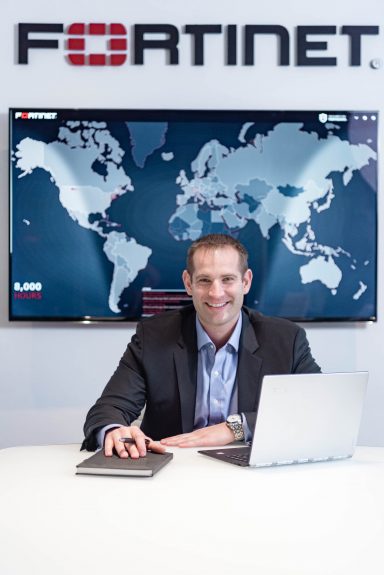Hardly a day goes by without some advice from the media about keeping yourself safe in cyberspace – stronger passwords, selective sharing, checking who kids are meeting online. Yet beyond our own personal cyber-footprint is a massive technical infrastructure that keeps our society running smoothly. With critical infrastructure ranging from transportation to water systems – and humans increasingly linked as endpoints in vast systems such as the Internet of Things or connected medical devices – the potential for disruption and danger is unnerving.

Fortunately, one person’s discomfort is another’s challenge, and BCIT Computing grad Derek Manky is inspired by the scope of the field in his current role as Global Security Strategist for Fortinet’s FortiGuard.
After graduating from the Computer Systems Technology (CST) Diploma, Data Communication Option, in 2003, Derek felt he was well prepared and his “skills were perfect to adapt into Fortinet and the network security vendor world.”
In this very technical niche, though, he warns “a combination of soft and hard skills is absolutely key. Communications classes and soft skills helped me extend my knowledge.”
As he moved up in seniority, his role has involved more time doing business development and sales enablement; keynote presentations; media interviews, including television and top tier publications; and, of course, managing others.
Derek is perhaps most inspired by the thought leadership central to his role, and the important work of shaping this growing industry. He sits on committees and working groups that most people only hear of in movies: the Cyber Threat Alliance, National Computer Emergency Response, INTERPOL and Cyber Fusion Center. These groups are working on leading edge projects that can yield some massive wins: last year Derek helped with a takedown of a $62 million dollar crime ring, a private sector-law enforcement joint project of the type that is becoming increasingly crucial.
Speaking to the shortage of professionals in the growing cybersecurity field, Derek advises there are lots of opportunities to get excited about. His suggestion for those considering the field: “find a domain you are interested in – forensics, threat analysis, User Interface (UI) implementations, industry alliances, law enforcement, big data analysis, emerging paths in Artificial Intelligence (AI)/Machine Learning – and then look at how you can hone your skill set around that. There are many applications to these domains today, much different than it was 10 years ago.”
In fact, the technical skill set needed to keep cyberspace secure will extend into many careers that haven’t typically recruited for this expertise before. The skills Derek learned in computing are increasingly opening doors to careers in law enforcement, research, intelligence organizations, entrepreneurship, as well as sales and technical marketing.
To help keep the skills coming, Derek is a member of the BCIT Computing Program Advisory Committee (PAC), which serves as a sounding board for Computing when it considers program changes, launch of new offerings, or other opportunities to best serve the technology industry in BC and beyond.
“Indeed it is a complex world, but looking at specific problems that are out there, and honing your skills to adapt to next generation solutions, is a good approach” advises Manky.
